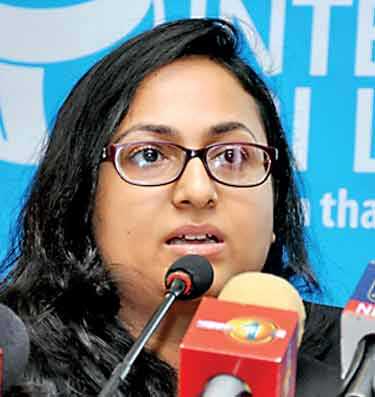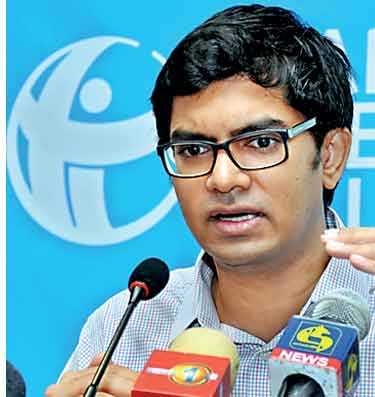Sunday Feb 15, 2026
Sunday Feb 15, 2026
Wednesday, 27 November 2019 01:51 - - {{hitsCtrl.values.hits}}
 |
 |
| Transparency International Sri Lanka Legal Officer Maheshi Herath |
Transparency International Sri Lanka Executive Director Asoka Obeyesekere |
By Shailendree Wickrama Adittiya
Transparency International Sri Lanka (TISL) yesterday launched the Politically Exposed Persons (PEPs) database, which currently includes 2,324 individuals and 240 State Owned Enterprises (SOEs), in an attempt to boost financial transparency in several sectors.
This is the country’s first PEPs register, TISL Executive Director Asoka Obeyesekere said at the launch, adding that, “These registers are not new. They have been in existence and are widely used in the banking sector.”
According to TISL, the information was gathered through the submission of 88 Right to Information (RTI) applications. At the launch, TISL Research and Policy Manager Maheshi Herath explained the key features of the database, which is accessible on the website peps.lk.
The database was compiled as per the recommendations of the Financial Action Task Force (FATF), which defines foreign PEPs as individuals who are or have been entrusted with prominent public functions by a foreign country and domestic PEPs as individuals who are or have been entrusted domestically with prominent public functions. This includes the categories listed on peps.lk, e.g. heads of State, senior politicians, senior Government, judicial, or military officials, and senior executives of SEOs.
FATF is an inter-governmental body with an objective to ‘set standards and promote effective implementation of legal, regulatory, and operational measures for combating money laundering, terrorist financing, and other related threats to the integrity of the international financial system.’
In addition to the categories mentioned in the FATF regulations, peps.lk also includes SOEs like Bank of Ceylon and Ceylon Electricity Board and their subsidiaries. The information available on the website includes the Ministry the SEO comes under, its profit/loss figures and main customers. Of the 240 SEOs included in the database, the senior executives of 140 have also been identified.
The profiles of individuals include basic information like date of birth, districts and school, as well as their connections, although additions are to be made to the available information.
“We are continuously striving to ensure that asset disclosures of senior public officials are in the public domain. This is an area TISL has been working on for many years and as soon as we get the information in a public domain, we are committed to putting it up onto this web platform for people to be able to actually monitor it and hold people accountable,” Obeyesekere said.
He added that the key benefit of peps.lk is having the structure of SOEs and all of their subsidiaries in one place. “This is important because Sri Lanka, until very recently, was on FATF’s grey list. This has huge economic consequences when we are looking at economic growth,” he said, adding that the issues around this grey list are predominantly anchored in being considered a country susceptible to money laundering. Obeyesekere, however, emphasised that there was a need to address the negative connotations surrounding PEPs in Sri Lanka, saying, “Being included in the database doesn’t necessarily mean you have done anything wrong. There can be people with high integrity on the register.”
Pix by Lasantha Kumara